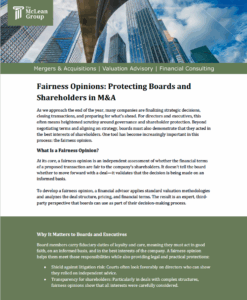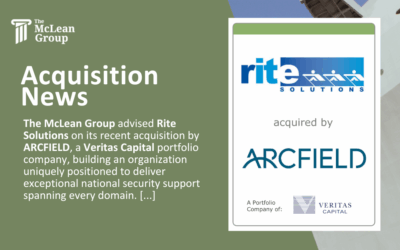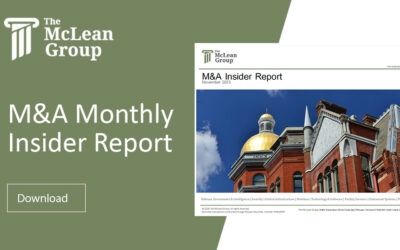Fairness Opinions: Protecting Boards and Shareholders in M&A
 As we approach the end of the year, many companies are finalizing strategic decisions, closing transactions, and preparing for what’s ahead. For directors and executives, this often means heightened scrutiny around governance and shareholder protection. Beyond negotiating terms and aligning on strategy, boards must also demonstrate that they acted in the best interests of shareholders. One tool has become increasingly important in this process: the fairness opinion.
As we approach the end of the year, many companies are finalizing strategic decisions, closing transactions, and preparing for what’s ahead. For directors and executives, this often means heightened scrutiny around governance and shareholder protection. Beyond negotiating terms and aligning on strategy, boards must also demonstrate that they acted in the best interests of shareholders. One tool has become increasingly important in this process: the fairness opinion.
What Is a Fairness Opinion?
At its core, a fairness opinion is an independent assessment of whether the financial terms of a proposed transaction are fair to the company’s shareholders. It doesn’t tell the board whether to move forward with a deal—it validates that the decision is being made on an informed basis.
To develop a fairness opinion, a financial advisor applies standard valuation methodologies and analyzes the deal structure, pricing, and financial terms. The result is an expert, third-party perspective that boards can use as part of their decision-making process.
Why It Matters to Boards and Executives
Board members carry fiduciary duties of loyalty and care, meaning they must act in good faith, on an informed basis, and in the best interests of the company. A fairness opinion helps them meet those responsibilities while also providing legal and practical protections:
- Shield against litigation risk: Courts often look favorably on directors who can show they relied on independent advice.
- Transparency for shareholders: Particularly in deals with complex structures, fairness opinions show that all interests were carefully considered.
- Clear process documentation: They provide a written record that the board evaluated the merits of a transaction thoughtfully.
Common Situations Where They’re Needed
Not every transaction requires a fairness opinion. But in many cases, boards would be well served to have one in place. Some common scenarios include:
- A company with many shareholders and/or multiple classes of equity.
- Transactions involving related parties or common ownership.
- Going-private deals or significant divestitures.
- Unsolicited offers, where a competitive process may not have taken place.
- Transactions with multiple forms of consideration (cash, stock, notes, or earnouts).
- Transactions involving Employee Stock Ownership Plans (ESOPs).
Each of these situations present unique risks, particularly if shareholder interests are not perfectly aligned with company management or directors.
The Takeaway
For boards and company leaders, a fairness opinion isn’t about adding red tape; it is about strengthening governance, protecting directors, and ensuring shareholders are treated fairly in transactions that can reshape a business.
With year-end approaching, many companies are weighing strategic alternatives, including merger and acquisition (M&A) activity. At The McLean Group, our valuation professionals regularly provide fairness opinions to help boards and executives navigate these high-stakes decisions with clarity and care. If your company is considering a significant transaction, understanding when and how to obtain a fairness opinion can help you move forward with confidence.
What Is a Fairness Opinion?
At its core, a fairness opinion is an independent assessment of whether the financial terms of a proposed transaction are fair to the company’s shareholders. It doesn’t tell the board whether to move forward with a deal—it validates that the decision is being made on an informed basis.
To develop a fairness opinion, a financial advisor applies standard valuation methodologies and analyzes the deal structure, pricing, and financial terms. The result is an expert, third-party perspective that boards can use as part of their decision-making process.
Why It Matters to Boards and Executives
Board members carry fiduciary duties of loyalty and care, meaning they must act in good faith, on an informed basis, and in the best interests of the company. A fairness opinion helps them meet those responsibilities while also providing legal and practical protections:
- Shield against litigation risk: Courts often look favorably on directors who can show they relied on independent advice.
- Transparency for shareholders: Particularly in deals with complex structures, fairness opinions show that all interests were carefully considered.
- Clear process documentation: They provide a written record that the board evaluated the merits of a transaction thoughtfully.
Common Situations Where They’re Needed
Not every transaction requires a fairness opinion. But in many cases, boards would be well served to have one in place. Some common scenarios include:
- A company with many shareholders and/or multiple classes of equity.
- Transactions involving related parties or common ownership.
- Going-private deals or significant divestitures.
- Unsolicited offers, where a competitive process may not have taken place.
- Transactions with multiple forms of consideration (cash, stock, notes, or earnouts).
- Transactions involving Employee Stock Ownership Plans (ESOPs).
Each of these situations present unique risks, particularly if shareholder interests are not perfectly aligned with company management or directors.
The Takeaway
For boards and company leaders, a fairness opinion isn’t about adding red tape; it is about strengthening governance, protecting directors, and ensuring shareholders are treated fairly in transactions that can reshape a business.
With year-end approaching, many companies are weighing strategic alternatives, including merger and acquisition (M&A) activity. At The McLean Group, our valuation professionals regularly provide fairness opinions to help boards and executives navigate these high-stakes decisions with clarity and care. If your company is considering a significant transaction, understanding when and how to obtain a fairness opinion can help you move forward with confidence.
What Is a Fairness Opinion?
At its core, a fairness opinion is an independent assessment of whether the financial terms of a proposed transaction are fair to the company’s shareholders. It doesn’t tell the board whether to move forward with a deal—it validates that the decision is being made on an informed basis.
To develop a fairness opinion, a financial advisor applies standard valuation methodologies and analyzes the deal structure, pricing, and financial terms. The result is an expert, third-party perspective that boards can use as part of their decision-making process.
Why It Matters to Boards and Executives
Board members carry fiduciary duties of loyalty and care, meaning they must act in good faith, on an informed basis, and in the best interests of the company. A fairness opinion helps them meet those responsibilities while also providing legal and practical protections:
- Shield against litigation risk: Courts often look favorably on directors who can show they relied on independent advice.
- Transparency for shareholders: Particularly in deals with complex structures, fairness opinions show that all interests were carefully considered.
- Clear process documentation: They provide a written record that the board evaluated the merits of a transaction thoughtfully.
Common Situations Where They’re Needed
Not every transaction requires a fairness opinion. But in many cases, boards would be well served to have one in place. Some common scenarios include:
- A company with many shareholders and/or multiple classes of equity.
- Transactions involving related parties or common ownership.
- Going-private deals or significant divestitures.
- Unsolicited offers, where a competitive process may not have taken place.
- Transactions with multiple forms of consideration (cash, stock, notes, or earnouts).
- Transactions involving Employee Stock Ownership Plans (ESOPs).
Each of these situations present unique risks, particularly if shareholder interests are not perfectly aligned with company management or directors.
The Takeaway
For boards and company leaders, a fairness opinion isn’t about adding red tape; it is about strengthening governance, protecting directors, and ensuring shareholders are treated fairly in transactions that can reshape a business.
With year-end approaching, many companies are weighing strategic alternatives, including merger and acquisition (M&A) activity. At The McLean Group, our valuation professionals regularly provide fairness opinions to help boards and executives navigate these high-stakes decisions with clarity and care. If your company is considering a significant transaction, understanding when and how to obtain a fairness opinion can help you move forward with confidence.
About The McLean Group
For over 30 years, The McLean Group has been providing investment banking and financial services offerings focused on the Defense, Government & Intelligence (DGI), Security, Critical Infrastructure, Maritime, Facility Services, Unmanned Systems, and Public Safety markets. Our 60+ professionals bring deep industry experience and relentless execution to every client engagement. We provide solutions that blend financial creativity with operational expertise. Whether we are providing transaction advisory, valuation opinions, or growth capital, our services are unmatched in these core markets. Learn more at www.McLeanLLC.com.
RECENT NEWS
Josh Butler Promoted to Managing Director
McLean, Va. – Monday, January 5, 2026 – The McLean Group, a leading middle-market investment bank specializing in mergers and acquisitions, announced today the promotion of Josh Butler to Managing Director within the firm’s Defense, Government & Intelligence (DGI) Practice.
“Josh has consistently demonstrated exceptional judgment, leadership, and a deep commitment to client success,” said Mitch Martin, Managing Director at The McLean Group. “He has played a critical role in executing complex transactions and advising founders, investors, and management teams across the defense and government services ecosystem. Josh’s promotion reflects both his strong track record and the confidence our firm has in his continued leadership.” […]
McLean advised Rite Solutions in its transaction with Arcfield
The McLean Group advised Rite Solutions on its acquisition by Arcfield, a Veritas Capital portfolio company and leading government technology and mission support provider. The transaction brings together two highly complementary organizations, expanding Arcfield’s capabilities across critical national security mission areas while enabling Rite Solutions to scale its expertise in software development, systems engineering, and undersea warfare. The combination strengthens support for U.S. defense and intelligence customers amid increasing global security demands. […]
Monthly Middle Market M&A Insider Report (November 2025)
The McLean Group’s November 2025 M&A Insider Report highlights key developments shaping the Defense, Government & Intelligence, Security, Critical Infrastructure, Maritime, and Technology sectors. This month’s report features notable transactions involving industry leaders such as Thoma Bravo, Amphenol, Voyager Technologies, Markon, and Armada, underscoring sustained investor interest in defense modernization, cybersecurity, aerospace, and mission-critical technology platforms, even as market participants navigate the post-shutdown operating environment. […]










